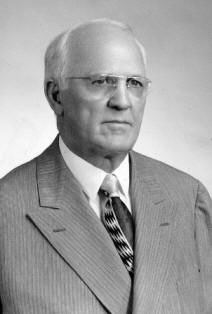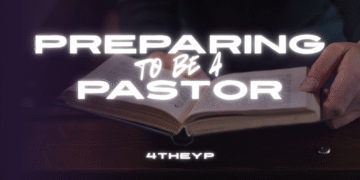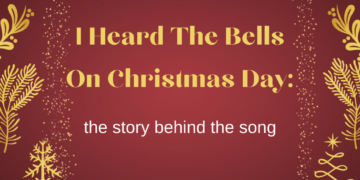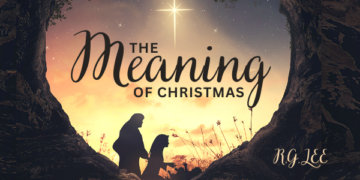The birth of a little Child the Christian world at this season celebrates. Christmas Day is a holy and happy day when we commemorate the coming of God’s Son into the world—the incarnation of God by way of the virgin birth. Never too happily can we sing. Never too eagerly can we ring the bells.
With the coming of the “dayspring from on high,” morning broke upon the world’s darkness—in Bethlehem—while men and women, bruised and bleeding, were in a darkness unlighted by flickering philosophical tapers and sputtering Judaistic lamps. What is the meaning, we ask, of Christmas to the world?
I. Christ Is a Manifestation
“And without controversy great is the mystery of godliness: God was manifest in the flesh, justified in the Spirit, seen of angels, preached unto the Gentiles, believed on in the world, received up into glory.”—I Tim. 3:16. Though Christmas is the celebration of the advent of Christ into the world by human birth, nobody should believe that Christmas marks the beginning of Christ, because the Son who rested on the bosom of the virgin Mary for a little while had, before this world was, rested on the bosom of the Father—before “God sent forth his Son, made of a woman” (Gal. 4:4). Jesus had glory with God before the world was (John 17:5).
II. Christmas Means a Manger
Luke 2:7 “And she brought forth her firstborn son, and wrapped him in swaddling clothes, and laid him in a manger; because there was no room for them in the inn.” Coldly the world, which later cruelly thrust Jesus out on the point of a spear, received Jesus on a pallet of manger straw. Messiah’s birth chamber was a stable—not a palace, not a human habitation. What abasement! How wonderful for us that the Lord of Glory was so humbled and abased for us, the vile and sinful progeny of Adam. Thinking of Christ stripping Himself of His robes and roles of glory, Flavel said, “If the sun had been turned into a wandering atom, if the most glorious angel in heaven had changed into a fly, it had been nothing to the abasement of the Lord of Glory.” Born as the very poorest are born, without attendants, He was the One through whom God worked and works sublimities without display.
III. Christmas Means a Marking
The lowly birthplace of Jesus was marked by a star. “When they had heard the king, they departed; and, lo, the star, which they saw in the east, went before them, till it came and stood over where the young child was.” “When they saw the star, they rejoiced with exceeding great joy.”—Matt. 2:9,10. That star marking the house to which the wise men from the East came testifies that the fullness of time had come, that the prophecies were accomplished, that He who had a name “as ointment poured forth” had come with a coming that stirred earth and Heaven, the sea and the dry land. For no other child did the heavens assume a new star. For no other child did wise men come from the East “to worship him” (Matt. 2:2). For no other child did angels descend from glory. For no other child did Heaven and earth bear witness—being marked by prophecy and a star.
IV. Christmas Means Music
“And the shepherds returned, glorifying and praising God for all the things that they had heard and seen, as it was told unto them.”—Luke 2:20. As the sun went down in the western sea that day, the stars came out, and the Messiah’s star shone bright. As the temple shepherds watched their flocks by night, in the midst of the starlit silence appeared a glory—and a voice. “And there were in the same country shepherds abiding in the field, keeping watch over their flock by night. “And, lo, the angel of the Lord came upon them, and the glory of the Lord shone round about them: and they were sore afraid. “And the angel said unto them, Fear not: for, behold, I bring you good tidings of great joy, which shall be to all people. “For unto you is born this day in the city of David a Saviour, which is Christ the Lord.”—Luke 2:8–11. The shepherds, filled with awe at the shining presence and the wondrous words, did not speak. Moving not, they gazed. And then suddenly, as they looked, the single messenger became a choir, and the night echoed with divinest music.
V. Christmas Means Mourning
Related tragically are these verses: “When Herod the king had heard these things, he was troubled, and all Jerusalem with him.” “Then Herod, when he saw that he was mocked of the wise men, was exceeding wroth, and sent forth, and slew all the children that were in Bethlehem, and in all the coasts thereof, from two years old and under, according to the time which he had diligently enquired of the wise men.” “Then was fulfilled that which was spoken by Jeremy the prophet, saying, “In Rama was there a voice heard, lamentation, and weeping, and great mourning, Rachel weeping for her children, and would not be comforted, because they are not.”—Matt. 2:3,16–18. While some laugh beneath the mistletoe, some grieve beside coffins or over graves. While some faces are as bright as fires aglow on home hearthstones, some faces are shadowed with intangible gloom. While some rejoice and are grateful for abounding health, some pine mournfully because of wasted, disease-smitten bodies. And some have not joy because they have not the righteousness which Christ, as Saviour, first imputes and then imparts. Some find Christmas a time of mourning because they have no calm in their conscience.
VI. Christmas Means Meeting
In the birth of Jesus, Heaven and earth meet. Coleridge, speaking of philosophy, said: “In wonder all philosophy began, in wonder all philosophy ends, and admiration fills up the interspace.” Thinking of Jesus’ natal night, of Bethlehem, of the angels, of the inn in which there was no room for the Prince of Glory, of the cattle stall in which He was born, of the fact that He was God held in a woman’s arms, of those who “wondered at those things which were told them by the shepherds” (Luke 2:18), we say, in the words of Shakespeare: “O wonderful, wonderful, and most wonderful wonderful! and yet again wonderful.” Heaven and earth meet. Shepherds served and angels sang.
VII. Christmas Means a Marring
I mean by “marring” that men mar the beauty of Christmas by riotous living rather than by reverence of the holy realities which the Christmas season brings to mind. Instead of worship, wickedness; instead of prayer, perversity; instead of devotion, drunkenness; instead of spiritual delight, carnal dancing; instead of expressions of gratitude, utterances of profane and vulgar thoughts; instead of peace, Mars tying crepe to many doorknobs; instead of consecration, carnality and love, by hellish alchemy, changed into lust; instead of hands handling the Bible, hands holding booze bottles; instead of gratitude, greed and grab and get.
VIII. Christmas Means the Master
This Christ whom the disciples called Master is He who, in eternity, rested on the bosom of the Father without a mother, and in time rested on the bosom of a mother without a father—Son of Man and Son of God, just as old as His Heavenly Father and ages older than His earthly mother. He who was in the manger later mastered disease into health, blindness into sight, deafness into hearing, lameness into suppleness and strength of muscles, leprosy into cleanness, storms into calm, scarcity of bread into food plenteous, dumbness into speech, death into life and grace into resurrection glory. He mastered sin, Satan, suffering, death, the grave and Hell. And through Him we can be more than conquerors.
ILLUSTRATION: In his portrayal of the nativity scene, Rembrandt focused attention entirely on the Babe in the manger. He did this by painting a shaft of light so that it falls exclusively on the Christ-child. Although he included other figures, they are shrouded in shadows. Rembrandt wanted nothing to detract from the significance of that baby—who was God in the flesh. He wanted Christ to be the sole object of adoration.

Pastor R.G. Lee







































